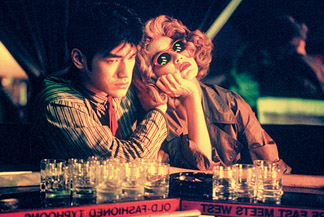Classic Movie Review: Chungking Express
By Edwin Davies
November 5, 2012
Wong and his cinematographer, Christopher Doyle, emphasize this idea by showing almost nothing of the broader city of Hong Kong. There are almost no establishing shots - probably because of the rough and ready way in which the film was shot - and much of the focus is on how the characters fit into their immediate surroundings and how they are placed relative to other people. The focus is so close that it's almost possible to imagine that nothing exists outside of the immediate area of the frame. The images in the film are beautifully composed, yet have a dashed off feel to them, as if they just happened to look that gorgeous, and the film is edited with a playfulness that is infectious - like Godard back when he was fun. All this creates a film in which the characters are islands of calm amidst roiling seas of activity. Quiet, self-contained, but ultimately isolated.
This is perhaps most apparent in Lin's character, even though she is, of the four principals, probably the least central to the story and initially seems to be the most comfortably independent. She is introduced as someone who thrives amidst the seediest elements of Hong Kong society, hiring drug mules whilst surrounded by grime and the messiness of life, yet when things go wrong she has no one to turn to. Her isolation is quite different from that of the other characters - her loneliness is that of the hardened criminal who struts around in sunglasses and a raincoat, brandishing a gun - but her chance encounter with Cop 223 in a bar reveals that, for all her affectation, her loneliness leads to the same place as his. Ultimately, his attraction to her might prove fleeting and insubstantial - after all, he only talks to her because he decides that he is going to fall in love with the next person he sees, being young and impetuous and whatnot - but their interaction promises to be just as profound as that being Faye and Cop 663, even if it lasts a fraction of the time.
Although Cop 223's story is sweet and exciting, it almost feels like little more than a prelude to that of Faye and Cop 663. So much so, that when I re-watched the film for the first time in nearly six years, I found myself struggling to remember any of the first story whilst vividly recalling almost all of the second, right down to individual, minor movements by the actors. The character of Faye veers slightly too closely to the trope now known as the Manic Pixie Dream Girl, the magical character who exists to make the life of a male protagonist better.
Still, Faye Wong's performance is so charmingly uninhibited that it completely lacks any of the archness that can make that character type so difficult to stomach. She is believable as someone who would fall so hard, and so completely in love with someone, that they would consider breaking into his apartment to improve it the proper and logical thing to do. It also helps that Wong Kar-wai uses California Dreamin', one of the all time great pop records, as a recurring motif for Faye, one which perfectly captures the hope and plaintive optimism of the character, whilst maintaining an autumnal sadness that undercuts the whimsy.
Meanwhile, Tony Leung is so heartrendingly lovelorn that you can't help but want someone to come along and fix him, even if that person's methods probably needed to be reconsidered before implementation. One of the key emotional moments in the film comes from a simple gesture: Tony Leung drinking a cup of coffee after being told that his ex-girlfriend has left a letter for him at the snack bar. Wong Kar-wai shoots the moment using a juddery slow-motion effect that he otherwise employs to heighten the emotion of action sequences like gun fights or chases, but here he uses it to stretch out and deaden the emotion, to make it last for a painfully long time. As he drinks his coffee at an agonisingly slow speed, Wong and Leung convey elegantly and wordlessly the crushing sadness of cop 663 as he is reminded of what he has lost.
It's a glorious moment that encapsulates the impressionistic style of Wong Kar-wai's films; seemingly simple and banal moments that tell the story of someone's entire life, if only we learn to view them in the right way. It's a wonderfully humanistic viewpoint that becomes all the brighter juxtaposed against the harsh neon glare of modernity.
Continued:
1
2




